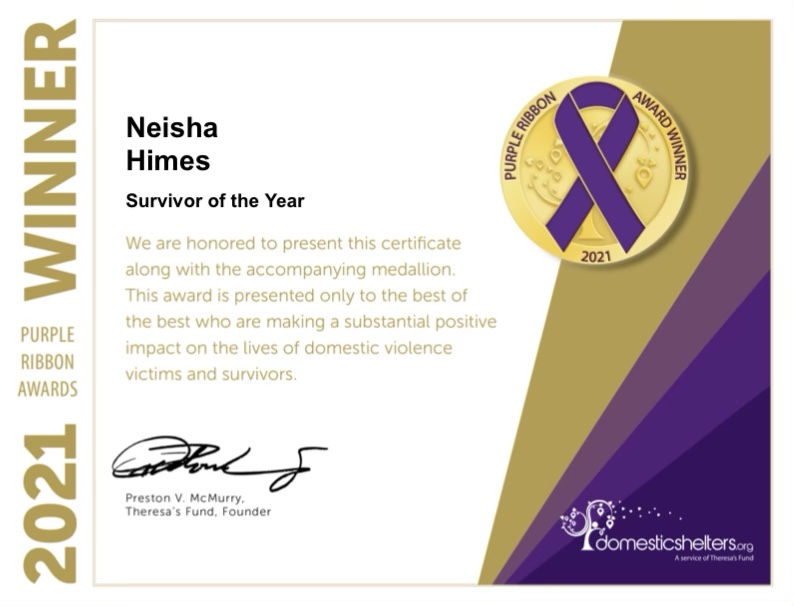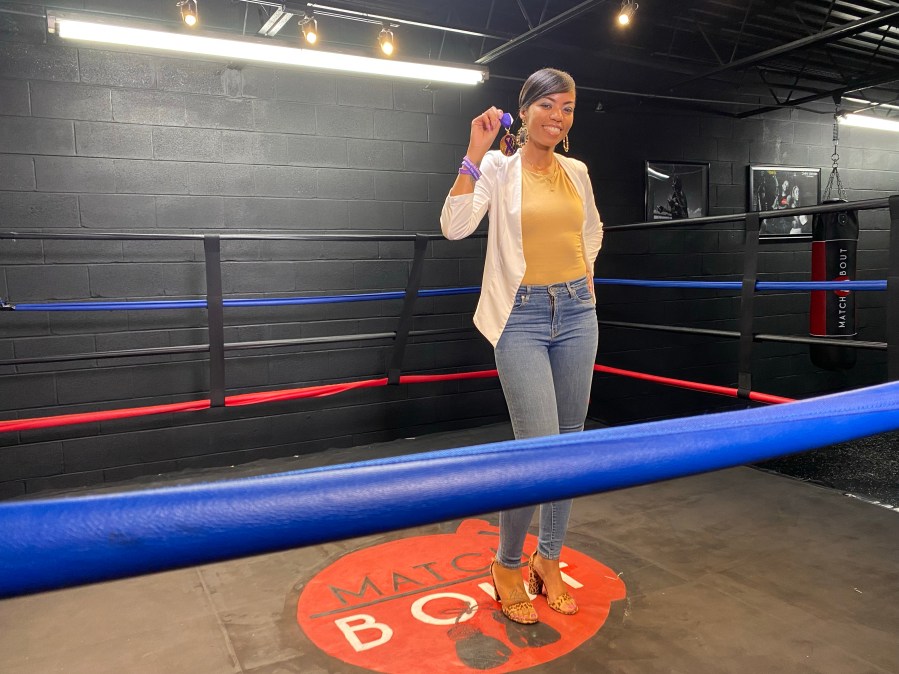CHESAPEAKE, Va. (WAVY) — A local domestic violence advocate was recently honored as the Purple Ribbon Survivor of the Year.
Neisha Himes is an abuse survivor turned world-class advocate. She was awarded the 2021 Survivor of the Year award by domesticshelters.org for her work across Hampton Roads and the country. She was also awarded $5,000 in grant funding from the organization.

She founded the Girls Recognizing Our Worth (GROW) Foundation in 2016. The nonprofit organization helps families escape abusive relationships.
Using the grant money, Himes opened an office space in Chesapeake for GROW. It was important for her to open the space during Domestic Violence Awareness Month.
“We’ll have a safe space to be able to meet clients,” Himes said.

Now, the “Survivor of the Year” is calling on more people to fight against domestic abuse and become awareness advocates.
Himes told 10 On Your Side that boxing saved her life. She started boxing to help heal after a toxic relationship.
“For years I’ve been beat. I’ve been beat down in more ways than one and I don’t ever want to feel that way again,” Himes said.
Boxing empowered her in a new way, because so much of boxing is about mental toughness.
“It’s about mentally knowing that you’re worth fighting for. It’s mentally standing up and saying, you know what, this is what I deserve,” she said.
It helped Himes feel stronger and more confident. A boxing mantra became her new life motto: “Pick my hands up. Pick my head up and keep it up!”
Himes said she became a domestic violence advocate after escaping an abusive relationship.
“He used to always tell me I was worthless. It came a point where I had ingested that so much that I believed it,” she said.
In that relationship, Himes often fought back during physical attacks, but she said it was never enough. After years of abuse, she created a safety plan to get out of that relationship in 2012. Now she uses her experience to help others live free of a controlling partner.
“When I finally got out of that situation, and I decided to start speaking out about it. I decided to start speaking out loud because it had to be a purpose to all of that pain,” Himes said.
Himes said her role as an advocate — and the national recognition — has shined a light on her work, but also added new pressure.
“In a way it showed me, you’re doing great work, but it added pressure. Nobody knew there were days that I wanted to quit.”
Himes said most survivors become advocates by volunteering at shelters, answering hotline emergency calls and even working for policy change. Although it’s important work, survivors often relive their own trauma as advocates when they hear the cries of help from others.
Meredith Noha, the Project HOPE coordinator at Chesapeake Regional, said many survivors of abuse deal with post-traumatic stress disorder, or PTSD.
“It’s kind of a double-edged sword, for people that have had the experience of being victimized. They are fantastic because they know what the victim has gone through. They have experienced it, but they have to be in the right place to assist someone else,” Noha said.
Project HOPE at Chesapeake Regional Healthcare is an interpersonal violence prevention program. It started in 2020, after a trauma track at the hospital showed a clear need for abuse intervention. Patients are referred to the program based on their patient records. All Chesapeake residents can use the program’s counseling and victim advocacy resources. Himes believes more people in the community must step into the ring to fight domestic abuse.
“It’s important to have allies from all different walks of life, all different backgrounds whether you’ve been through domestic violence or not because we can’t do it by ourselves,” Himes said. “We need more non- survivors to join the fight because it can’t just be up to us to fight domestic violence.”
You can be an advocate, “by believing somebody when they say they are in an abusive relationship,” Noha said.
Other ways to be an advocate:
- Ask are you okay? How can I help you?
- Keep an emergency bag at your house
- Donate to a shelters
- Donate new household goods
- Enroll in a National Organization for Victim Assistance or YWCA advocacy training program
For Himes, the fight continues.
“Someone is always going to need help. Someone is always going to need to hear there is hope, you know, you can do it,” she said.
Every month, Himes hosts a domestic violence support group called GROWing Fighters. To sign up for the class or seek help, you can email info@growfoundationva.org.
Avalon Center in Williamsburg
- Phone: 757-258-5022
- Offers transitional housing, emergency shelter, youth services, legal advice and counseling.
- 24-hour Crisis Hotline: 757-258-5051
- Website: avaloncenter.org
Eastern Shore Coalition Against Domestic Violence
- Hotline number: 757-787-1329
- Offers: emergency shelter, 24-hour crisis hotline, individual counseling, safety planning, children’s services, legal advocacy, accompaniment during hospital visits and court appearances and support groups to survivors of domestic violence and sexual assault.
- Website: escadv.org
Samaritan House Inc. in Virginia Beach
- Phone: 757-631-0710
- Offers counseling, emergency shelter placement and safety planning.
- 24-hour Crisis Hotline 757-430-2120
H.E.R. Shelter in Portsmouth
- Phone: 757-485-1445
- Offers emergency services, court assistance, shelter, employment and housing assistance.
- 24-Hour Crisis Hotline: 757-485-3384
- Website: hershelter.com
The Genieve Shelter in Suffolk
- Phone: 757-925-4365
- Offers emergency shelter and crisis services.
- Crisis Hotline 757-705-2025 or 757-353-1439
- Contáctanos para ayuda inmediata 1-800-969-4673
- Website: thegenieveshelter.org
Transitions Family Violence Services in Hampton
- Phone: 757-722-2261
- Offers emergency shelter, crisis services, court advocacy, and counseling.
- 24-hour Crisis Hotline 757-723-7774
- Website: transitionsfvs.org
YWCA South Hampton Roads in Norfolk
- Phone: 757-625-4248
- Offers emergency shelter and crisis services.
- 24-hour Crisis Hotline 757-251-0144
- Website: ywca-shr.org
National Human Trafficking Task Force Hotline: 1-888-3737-888.
Hampton Roads Human Trafficking Task Force: 757-430-2120
Blue Campaign to bring an end to Human Trafficking
Prevent Child Abuse America – Coronavirus Resources & Tips for Parents, Children & Others.
Child abuse and neglect are serious problems that can have lasting harmful effects on its victims. For more information on preventing child abuse and neglect check out resources from the CDC, or call The Childhelp National Child Abuse Hotline at 1-800-422-4453 for help.


























